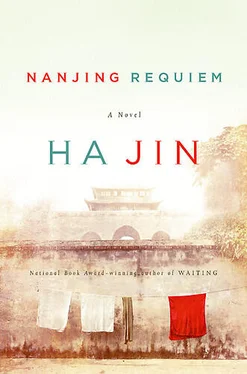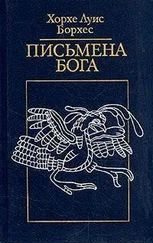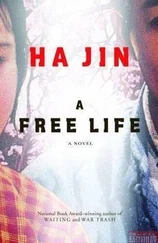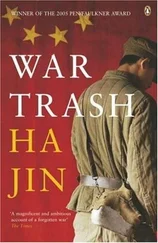“Make sure they share everything.”
“I will.” The cook’s palm was cupped behind his ear as he spoke; he appeared to be slightly hard of hearing.
Holly and Siuchin would have to work in the afternoon as some refugees had just arrived from Anhui, so I stayed another hour and then headed back to the train station. It had begun sprinkling, fat raindrops spattering on treetops, roofs, and my striped umbrella. All the way home, I pondered the two women’s lives. I admired them but couldn’t say that their way of living was better than mine or Minnie’s. Even if we had wanted to live like they did, we were no longer free to do so. In Minnie’s case, on her shoulders was the responsibility for those underprivileged women and girls at Jinling, who viewed her as their protector.
THE SUMMER MOVED ON almost uneventfully until early July, when a letter arrived from Luoyang. It contained a handwritten note and a newspaper clipping that had my son’s snapshot on it. The title of the brief article announced: “Traitor Killed by the Partisans.” I read the contents while my heart began thumping so violently that I had to sit down. The article stated that Haowen had been murdered outside a theater in that city. “We are glad that another traitor got his comeuppance,” the author declared.
Liya read out the note, written in pencil, which said: “Aunt Gao, your son, Haowen, was killed. He was a good man and they stabbed him when he went out to see a civilian patient in the suburbs. This was probably because a Chinese colonel, a POW, had died in his care. Haowen really did his best for the man, but he had been wounded fatally in the stomach. I am very sorry about your loss.” Strangely, the sender of the letter hadn’t signed his name, but the fluid handwriting indicated that he must be Chinese, probably a comrade of Haowen’s who also served in the Japanese army and therefore was afraid to identify himself.
Both Liya and I burst out weeping. This scared Fanfan, who started bawling too. Liya held him up, her hand covering his mouth. “Don’t cry, don’t cry, Fanfan. Mom has goodies for you,” she said, and took him to the sitting room. When she threw him a half-empty pack of toffee, he stopped blubbering.
Our world was turned upside down, but we dared not make too much noise. We locked the doors and closed the window curtains. Then Liya and I collapsed on the bed, sobbing our hearts out. Our heads touched each other and our hair mingled, wet with tears. “Mom, why did this happen to us? Why?” she went on wailing.
Similar questions were rising in my mind as well, but I was too distraught to say anything coherent. By instinct we knew we must not let our neighbors hear us, so we continued weeping in a subdued way, muffling our voices with our palms.
It would be hard for Liya and me to conceal our grief. I already felt half dead and might not be able to go to work the following day. What should we tell others about the death in our family? We could not say that Haowen had been assassinated by the partisans. That would amount to admitting that he’d been a traitor and deserved the punishment. But wasn’t his death already known to lots of people? True, yet it might be known only in Henan Province. Here no one but Minnie knew he had been a doctor in the Japanese army. We might be able to guard the secret of his identity, even if others saw us mourn his death. Liya and I decided to tell people that Haowen had been killed by the Japanese on his way back to China. It was a lie, but it might protect us and also keep his name clean.
We wouldn’t be able to do anything about bringing Haowen’s body home, and would have to leave him somewhere like a nameless ghost wandering in the wilderness. The Japanese didn’t ship their dead soldiers back to Japan. At most they would cut off a finger from a body, burn it with other dead men’s fingers, and then send a bit of the ash to each family. The thought of my son’s body not being interred properly suddenly seized my heart with a piercing pang, and I cried again.
That night, after Fanfan had gone to sleep, Liya and I talked about Haowen’s wife and son in Tokyo. The more we thought about their future, the more hopeless we felt. For the time being, there was no way we could help Mitsuko and Shin. As a matter of fact, as long as the war continued, we dared not even acknowledge their existence publicly. We believed that the Japanese army must already have notified Mitsuko of her husband’s death. I couldn’t help but imagine the miserable widowhood awaiting her. From now on Shin would have no father and might be treated as a Chinese bastard by other children, who might ridicule and bully him. As though several hands were twisting my insides, I tossed in bed, sobbing again.
The next day I stayed in bed, my limbs so weak that I felt partly paralyzed. Liya cooked rice porridge and brought it to the bedside, but I couldn’t eat, choked by a hot lump in my throat. Mrs. Dennison came late in the afternoon and was apparently perturbed by my sickness. I told her that my son had just been killed by the Japanese on his way back to see us, so I needed a couple of days to grieve and recuperate. She was surprised to hear that Haowen had been in Japan, but knowing he’d been my only son, she could see that the loss was colossal to our family. She sighed and cursed the Japanese, saying she’d have wiped out Tokyo if she could.
“Rest well, Anling,” Mrs. Dennison said. “I’ll ask Rulian to step into your shoes for a while.”
I insisted that I’d be up and about soon. In the meantime, I could have Liya act in my stead, since my job didn’t need much expertise and I could tell her what to do. The old woman thought about my suggestion, then said, “That’s true. You could manage things even if you’re in bed. Let Liya be your deputy for a few days.”
For a week I lay in bed. In my diary I just mentioned Haowen’s death as a crime committed by the Japanese and that Yaoping and I were sonless now. I was afraid that someone might read what I’d written, which was always a possibility. I woolgathered a lot, indulging in memories of the old days. I remembered that twenty years before, in the fall, we’d gone often to Purple Mountain to look for mushrooms. At that time the grand mausoleum in honor of Sun Yat-sen wasn’t there yet, as he was still alive. We’d bring along a small hamper of food, fruits, and bottles of drink and would picnic at the lakeside or under the huge stone animals and the immense maples in the royal park. The weather always seemed to be gorgeous and the sky blue and high, while warm breezes shook the grass and leaves from time to time. We’d also go to the Yangtze for boating. Yaoping was so happy on those outings that he often played a bamboo flute while I sat at the stern of a rented dinghy, applying an oar noiselessly. Meanwhile, Haowen and Liya would dive and float in the shallows. The boy invented a swim style he called frog-paddle, which combined the arm movement of the breaststroke with the kicking of the butterfly. He tried to teach Liya how to do it, but she couldn’t synchronize her limbs that way. Joyful occasions like those felt as remote as if they had belonged to another life.
I also recalled the times we’d gone to fly kites on the embankment. Yaoping was good with his hands and made various types of large creatures, like a hawk, a multicolored butterfly, a phoenix, a centipede. People would enviously watch him flying them. Haowen was always excited about those trips. Once he came down with a raging fever for two days afterward, thanks to running in the summer’s heat for hours. Now he was dead, and we had no idea where his body was. Even if he were alive, I suspected he could never be a happy man again.
Had he not been a family man, he could have abandoned his wife by deserting the Imperial Army soon after he’d landed in China. He might have joined the resistance force and survived. People might even have respected him as “a real man” who put his country above his family, devoting himself to fighting our national enemy. But he’d been doomed by his nature as a good, faithful, average man.
Читать дальше











